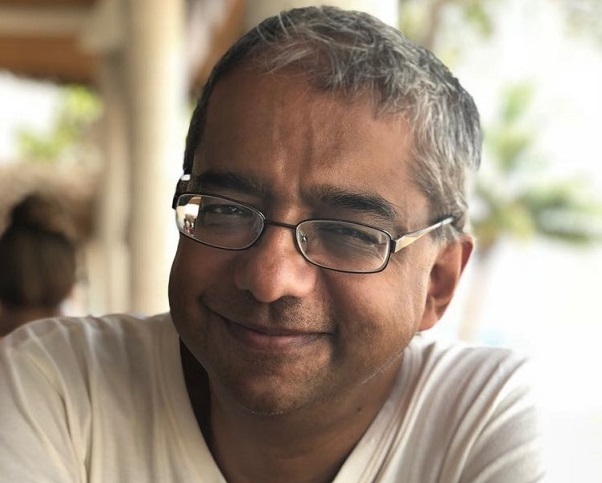By Jekhan Aruliah
If your objective is to make money you’d better be sure you know how to sell. If you need to feed and house and educate your family. Or you need to impress your colleagues with the latest baubles, gadgets and fancy cars. Whether you are coding apps, handmaking ornaments, cultivating mangoes, or stealing bicycles. If your objective is to make money you’d better be sure you can sell what you make.
There is a thriving Worldwide industry providing equipment and training to poor people. People who have few options but to take what is given. Generally free, often with NGO or Diaspora funding, these programmes desire to help the poor make a living. Very laudable. In my time in Jaffna I have met and observed and heard charitable programmes who donate sewing machines, cows, skills training in IT and English and Entrepreneurship etc. Most are proudly “Non Profit”. Which is quite frankly what many of them deliver to the poor people - No Profit.
I have met donors complain that they return after a few months to the recipients of their charity only to find the training has been forgotten and the donated sewing machine or cow or whatever has been sold. Condemning the ingratitude, dishonesty and laziness, they blame the poor for their own poverty.
These programmes frequently fail because they don’t solve the problem of selling. Training is easy. A few hours of lectures, some sweet tea and vaddai, rounded off with a certificate awarding ceremony is easy. Particularly easy if nothing meaningful is done a year later to see if the training actually made a difference. Donating equipment is even easier. Turn up with the kit, hand it over, and take the photographs for the website. Don’t get me wrong, if these gifts of skills and kit are combined with a route to market and earning money they are wonderful. But they generally aren’t.
Selling is hard. You have to understand what the market wants, how to evolve your products and services to make and meet market needs, how much the market will pay, how to let the market know you exist, how to get the market to trust you, how to take payment, how to deliver your products and services, how to deal with questions and complaints, how to hold your customer base for repeat business, and so much more. For small businesses you know if your selling is successful by how much money you make and whether the debt collector is looking for you.
Selling skills become powerful with time and experience. Not from YouTube and Powerpoint and “roadmaps” and vaddai and sweet tea and certificates.
HappyMarket.lk is a new initiative borne in Jaffna that aims to take responsibility for selling. An initiative headed by Mr.
Robinson B Prashanthan, a Jaffna entrepreneur whose businesses run from IT to environmentally friendly crockery (
made from parts of the areca palm). I have met Prashanthan to say hello every now and then over the last couple of years, but never got to know him. This changed early in 2019 when Prashanthan showed me his areca plate factory in Visvamadu Killinochchi, and when I visited his software offices in Jaffna Town.
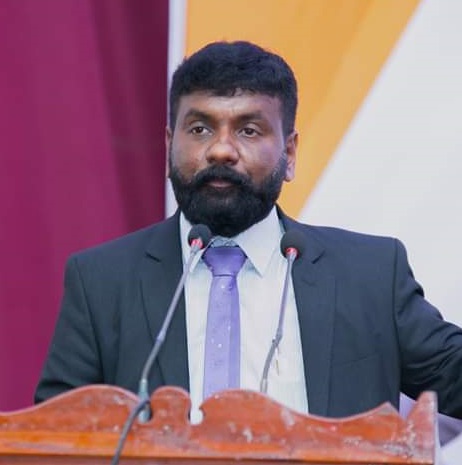
In our conversations I found Prashanthan’s approach matches my own:
a)
Profit Is nothing to be ashamed of. Make a good profit by giving a good deal to your customers, your suppliers, and your staff. What you then do with your profit is up to you. Eat it, wear it, drive it, reinvest it, that’s your business.
b)
The key need of today particularly in the North and East is to create successful businesses which will create good jobs, grow the economy and bring prosperity. We need to build businesses that provide examples for other businesses and investors to follow.
c)
The time has come to support the most promising to succeed, not only help the weakest to survive.
To quote South Africa’s former Archbishop Desmond Tutu, one of that country’s leading anti-apartheid campaigners,
"There comes a time when we need to stop just pulling people out of the river. We need to go upstream and find out why they are falling in".
We decided to do this article to mark the launch of
HappyMarket.lk on 26th April 2019. Starting with just a few products,
HappyMarket will grow over the coming months and years. Prashanthan has appointed Miss Thuvaraka Krishnamoorthy as the manager for
HappyMarket.
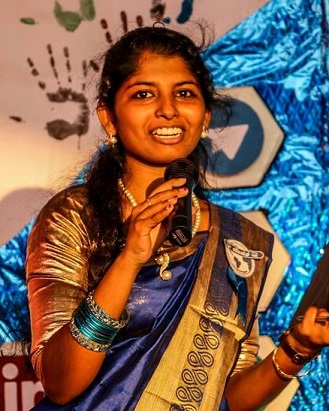 HappyMarket
HappyMarket provides a marketplace for micro and small businesses.
But not for all of them. HappyMarket only allows selected suppliers to offer specific products and services.
The reason for this selection is
HappyMarket provides much more than a marketplace.
HappyMarket identifies businesses with the strength and potential to become great.
HappyMarket provides mentoring and feedback for the businesses to develop their products, obtain certifications (e.g. organic, health, etc), improve their quality from manufacturing to packaging and branding.
HappyMarket will identify business opportunities, and help provide samples of products to potential customers. For example,
HappyMarket took samples of woven baskets to a leading tea brand pitching the idea of using the baskets as boxes for premium teas.
HappyMarket ensures its website retains a high profile by continuous Search Engine Optimisation (SEO).
HappyMarket provides an online payment gateway to take immediate payment when an order is taken from its website. And
HappyMarket takes a direct role in ensuring products are successfully delivered to customers Worldwide.
For this service,
HappyMarket puts a 20%-30% mark-up on the products it sells. This covers third party costs such the online payment processing fees. The producers pay no other charges to
HappyMarket except this “success fee” on actual sales. The producers make no up-front payments.
HappyMarket uses this income to invest in the support, maintenance and development of its online marketplace. It spends on marketing costs, certification, brand development etc. And providing advice and support to the entrepreneurs who have joined the market. And yes, when the time comes it will make some profit.
Prashanthan commented that Northern entrepreneurs have many issues to overcome. One of these is product quality. During 30 years of war, many people in the North didn’t worry too much about the quality of their possessions. What was the point when they may have to abandon them at any moment due to the fighting. So long as a chair didn’t collapse when you sat on it, it didn’t matter if it wobbled. Craftsmen left the region to flee the war, so their craft wasn’t passed on to the next generations. Quality became of secondary importance. Such imperfections maybe acceptable to consumers surviving in a war zone. But in times of peace they are the mark of shoddy careless workmanship. Even ten years after the end of the war, many businesses in the North still have not worked out how to judge what modern markets require and what new opportunities exist.
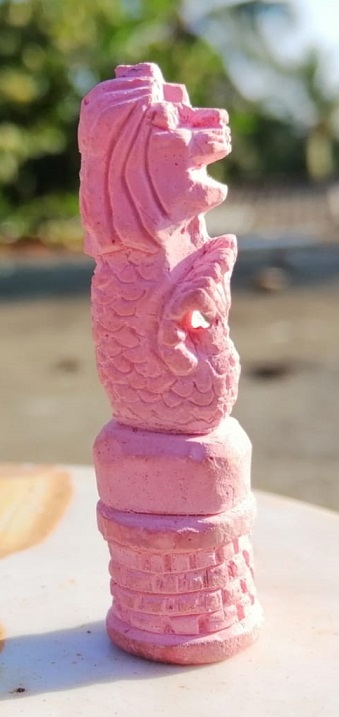
Prashanthan told me of an old lady in Neervaly who makes hats from banana fibre. It takes her two days to make a small hat which she can sell for Rs300, earning her a meagre Rs150 per day. In Cambodia he saw the same weaving skills being used to produce boxes for bottles of premium alcohol, earning the artisan a decent wage. I myself met a young woman from Delft Island at a market in the Jaffna Kachcheri. She makes animals from seashells. She sold me a seashell peacock for Rs250. When I asked she said it took her more than a day to make. Even though the ornament was pretty unlovely, it showed her skill and dexterity which could be put to much more productive and profitable uses.
As part of my visit HappyMarket’s manager, Thuvaraka, had arranged for me to meet three producers with examples of their work. All three are artists, producing work demonstrating what to me is miraculous skill and talent. However, in my opinion, they use their amazing skills to make products that have very limited commercial value. HappyMarket by providing them with support and exposing them to new ideas hopes to turn their promising abilities into the source of good livelihoods.
Mr.Indrasekara Thanuwaran, 28 years old, lives with his parents and one brother. Having attended the prestigious Jaffna Central College, he went on to do an HND diploma in IT. He earns a living as a freelance website and software developer for online businesses. His real passion is making wooden models of ships and planes. Using toothpicks and ice-cream sticks, Indrasekara’s models are a few inches in size. Despite their tiny size, the models have moving parts. The model of the ship below is approximately the length of one toothpick, which can be seen on its side. Indrasekara also carves statues out of sticks of chalk (the sort used by school teachers at the blackboard).
Indrasekara's wooden models take between 3 to 5 days to produce. To earn at least Rs1,300 per day, the wage of an unskilled labourer shovelling concrete on a building site, he would have to sell these 3 inch models for at least Rs4,000/= at the rate of 10 a month. While I personally would see this as a good price for such an interesting piece, I wouldn’t want more than one killing off the possibility of repeat sales to the likes of me. Currently Indrasekara shows his work at exhibitions, and gives the models away as free gifts to his friends.
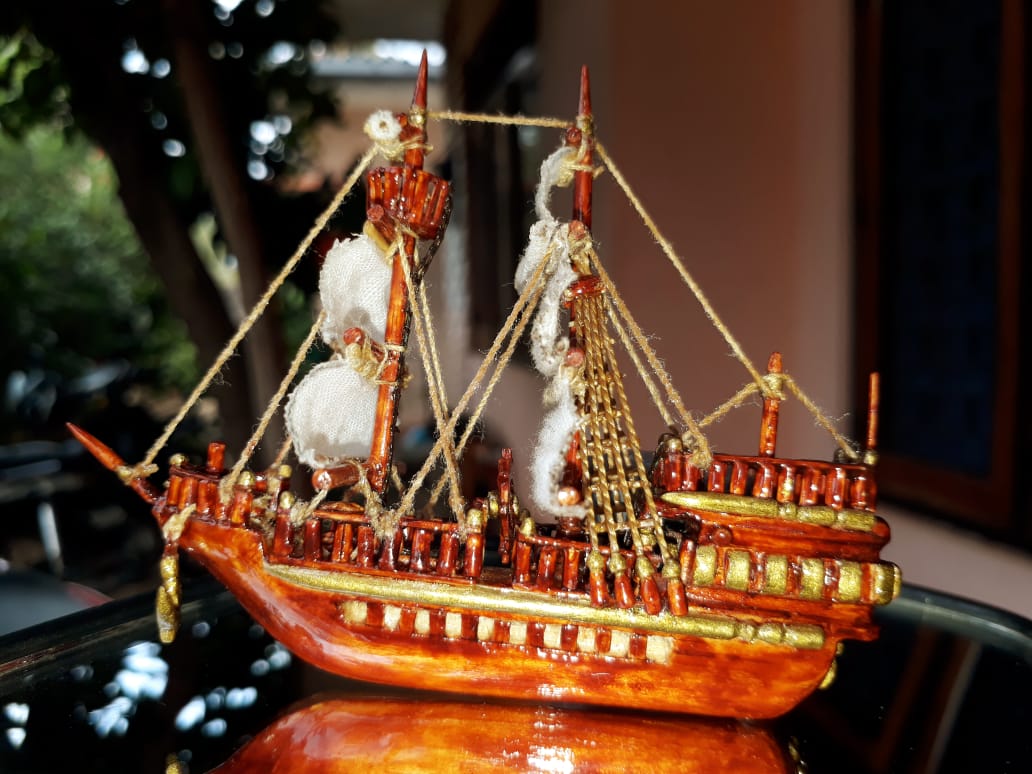
David and Shalomi Kanakaratnam, both 28 years old and recently married, live in Manipay. He works in a hardware shop while she has taught at a Montessori school and gives English language tuition for Grade 5 students. Together they produce wood burning art (
pyrography). David’s most amazing skill, in my opinion, is his ability to carve figurines in a single pencil lead. They would like to open a shop to sell their art, but are worried at taking on the commitment of renting a premises, paying the electricity and water bills, and still making enough to live on.
HappyMarket offers a great opportunity for these young people. An opportunity to develop their skills and products to be attractive to an international market. An opportunity to sell their products risk free through the HappyMarket website. And the opportunity to network with other artists, customers, and even people like me who can offer new ideas and suggestions.
A couple of years ago I came across these 3D cards by the UK company
Cardology at a household exhibition in London. The cards are designed by one of the proprietors, who is an engineer and can ensure the 3D structures open and close smoothly and are robust. They get the components of their cards laser printed, and then have them assembled in Thailand. These cards sell for around Rs2,000/=, equivalent to £9. Less time and effort than it takes to make a seashell peacock and for 8 times the price!
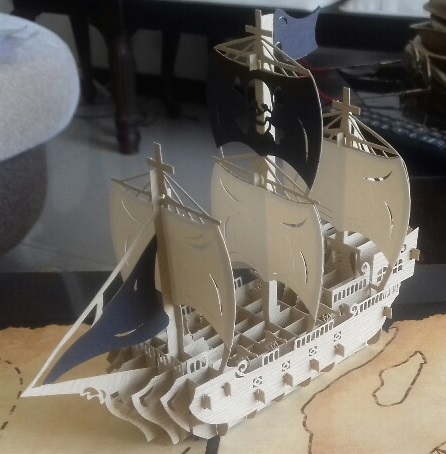 There will be people who visit HappyMarket whose vision enables them to see beyond the products on sale.
There will be people who visit HappyMarket whose vision enables them to see beyond the products on sale. They will see the raw skills and the materials that
HappyMarket showcases. They may see new opportunities for the design and the dexterity skills. They may see novel uses for the materials, the banana fibres, the woods, stones, ceramics, shells and fabrics. They may see opportunities in the
HappyMarket network, from supplier to customer, to offer completely new products and services.
HappyMarket is far more than just a shop selling products.
Prashanthan is keen to partner with other organisations and people. Already, before launching HappyMarket, he has partnered with the Jaffna NGO Council. He isn’t particularly looking for cash investment. He is looking to widen his network to provide more routes to market, and to make links with other producers who may subcontract to HappyMarket suppliers. He is looking for endorsements from happy customers and organisations who have seen what HappyMarket is doing, and by their endorsements will build up HappyMarket’s visibility and credibility.
HappyMarket is a partner for organisations providing training and equipment, who want their beneficiaries to be able to take their goods and services to market. And earn money for their livelihoods.
While
HappyMarket is starting in the Northern Province, Prashanthan will in due course open it to small entrepreneurs across Sri Lanka. He wants it to become a powerful channel for small businesses in Sri Lanka to earn their livings. Bridging the gap to market that hinders small entrepreneurs from successful selling.
Robinson B Prashanthan can be contacted at
rb@innovay.com. Thuvaraka Krishnamoorthy can be contacted at
happymarketlk@gmail.com
( — The writer Jekhan Aruliah was born in Sri Lanka and moved with his family to the UK when he was two years of age. Brought up in London, he graduated from Cambridge University in 1986 with a degree in Natural Sciences. Jekhan then spent over two decades in the IT industry, for half of which he was managing offshore software development for British companies in Colombo and in Gurgaon (India). In 2015 Jekhan decided to move to Jaffna where he is now involved in social and economic projects. He can be contacted at jekhanaruliah@gmail.com — )
 In our conversations I found Prashanthan’s approach matches my own:
a) Profit Is nothing to be ashamed of. Make a good profit by giving a good deal to your customers, your suppliers, and your staff. What you then do with your profit is up to you. Eat it, wear it, drive it, reinvest it, that’s your business.
b) The key need of today particularly in the North and East is to create successful businesses which will create good jobs, grow the economy and bring prosperity. We need to build businesses that provide examples for other businesses and investors to follow.
c) The time has come to support the most promising to succeed, not only help the weakest to survive.
To quote South Africa’s former Archbishop Desmond Tutu, one of that country’s leading anti-apartheid campaigners, "There comes a time when we need to stop just pulling people out of the river. We need to go upstream and find out why they are falling in".
We decided to do this article to mark the launch of HappyMarket.lk on 26th April 2019. Starting with just a few products, HappyMarket will grow over the coming months and years. Prashanthan has appointed Miss Thuvaraka Krishnamoorthy as the manager for HappyMarket.
In our conversations I found Prashanthan’s approach matches my own:
a) Profit Is nothing to be ashamed of. Make a good profit by giving a good deal to your customers, your suppliers, and your staff. What you then do with your profit is up to you. Eat it, wear it, drive it, reinvest it, that’s your business.
b) The key need of today particularly in the North and East is to create successful businesses which will create good jobs, grow the economy and bring prosperity. We need to build businesses that provide examples for other businesses and investors to follow.
c) The time has come to support the most promising to succeed, not only help the weakest to survive.
To quote South Africa’s former Archbishop Desmond Tutu, one of that country’s leading anti-apartheid campaigners, "There comes a time when we need to stop just pulling people out of the river. We need to go upstream and find out why they are falling in".
We decided to do this article to mark the launch of HappyMarket.lk on 26th April 2019. Starting with just a few products, HappyMarket will grow over the coming months and years. Prashanthan has appointed Miss Thuvaraka Krishnamoorthy as the manager for HappyMarket.  HappyMarket provides a marketplace for micro and small businesses. But not for all of them. HappyMarket only allows selected suppliers to offer specific products and services.
The reason for this selection is HappyMarket provides much more than a marketplace. HappyMarket identifies businesses with the strength and potential to become great. HappyMarket provides mentoring and feedback for the businesses to develop their products, obtain certifications (e.g. organic, health, etc), improve their quality from manufacturing to packaging and branding. HappyMarket will identify business opportunities, and help provide samples of products to potential customers. For example, HappyMarket took samples of woven baskets to a leading tea brand pitching the idea of using the baskets as boxes for premium teas.
HappyMarket ensures its website retains a high profile by continuous Search Engine Optimisation (SEO). HappyMarket provides an online payment gateway to take immediate payment when an order is taken from its website. And HappyMarket takes a direct role in ensuring products are successfully delivered to customers Worldwide.
For this service, HappyMarket puts a 20%-30% mark-up on the products it sells. This covers third party costs such the online payment processing fees. The producers pay no other charges to HappyMarket except this “success fee” on actual sales. The producers make no up-front payments.
HappyMarket uses this income to invest in the support, maintenance and development of its online marketplace. It spends on marketing costs, certification, brand development etc. And providing advice and support to the entrepreneurs who have joined the market. And yes, when the time comes it will make some profit.
Prashanthan commented that Northern entrepreneurs have many issues to overcome. One of these is product quality. During 30 years of war, many people in the North didn’t worry too much about the quality of their possessions. What was the point when they may have to abandon them at any moment due to the fighting. So long as a chair didn’t collapse when you sat on it, it didn’t matter if it wobbled. Craftsmen left the region to flee the war, so their craft wasn’t passed on to the next generations. Quality became of secondary importance. Such imperfections maybe acceptable to consumers surviving in a war zone. But in times of peace they are the mark of shoddy careless workmanship. Even ten years after the end of the war, many businesses in the North still have not worked out how to judge what modern markets require and what new opportunities exist.
HappyMarket provides a marketplace for micro and small businesses. But not for all of them. HappyMarket only allows selected suppliers to offer specific products and services.
The reason for this selection is HappyMarket provides much more than a marketplace. HappyMarket identifies businesses with the strength and potential to become great. HappyMarket provides mentoring and feedback for the businesses to develop their products, obtain certifications (e.g. organic, health, etc), improve their quality from manufacturing to packaging and branding. HappyMarket will identify business opportunities, and help provide samples of products to potential customers. For example, HappyMarket took samples of woven baskets to a leading tea brand pitching the idea of using the baskets as boxes for premium teas.
HappyMarket ensures its website retains a high profile by continuous Search Engine Optimisation (SEO). HappyMarket provides an online payment gateway to take immediate payment when an order is taken from its website. And HappyMarket takes a direct role in ensuring products are successfully delivered to customers Worldwide.
For this service, HappyMarket puts a 20%-30% mark-up on the products it sells. This covers third party costs such the online payment processing fees. The producers pay no other charges to HappyMarket except this “success fee” on actual sales. The producers make no up-front payments.
HappyMarket uses this income to invest in the support, maintenance and development of its online marketplace. It spends on marketing costs, certification, brand development etc. And providing advice and support to the entrepreneurs who have joined the market. And yes, when the time comes it will make some profit.
Prashanthan commented that Northern entrepreneurs have many issues to overcome. One of these is product quality. During 30 years of war, many people in the North didn’t worry too much about the quality of their possessions. What was the point when they may have to abandon them at any moment due to the fighting. So long as a chair didn’t collapse when you sat on it, it didn’t matter if it wobbled. Craftsmen left the region to flee the war, so their craft wasn’t passed on to the next generations. Quality became of secondary importance. Such imperfections maybe acceptable to consumers surviving in a war zone. But in times of peace they are the mark of shoddy careless workmanship. Even ten years after the end of the war, many businesses in the North still have not worked out how to judge what modern markets require and what new opportunities exist. Prashanthan told me of an old lady in Neervaly who makes hats from banana fibre. It takes her two days to make a small hat which she can sell for Rs300, earning her a meagre Rs150 per day. In Cambodia he saw the same weaving skills being used to produce boxes for bottles of premium alcohol, earning the artisan a decent wage. I myself met a young woman from Delft Island at a market in the Jaffna Kachcheri. She makes animals from seashells. She sold me a seashell peacock for Rs250. When I asked she said it took her more than a day to make. Even though the ornament was pretty unlovely, it showed her skill and dexterity which could be put to much more productive and profitable uses.
As part of my visit HappyMarket’s manager, Thuvaraka, had arranged for me to meet three producers with examples of their work. All three are artists, producing work demonstrating what to me is miraculous skill and talent. However, in my opinion, they use their amazing skills to make products that have very limited commercial value. HappyMarket by providing them with support and exposing them to new ideas hopes to turn their promising abilities into the source of good livelihoods.
Mr.Indrasekara Thanuwaran, 28 years old, lives with his parents and one brother. Having attended the prestigious Jaffna Central College, he went on to do an HND diploma in IT. He earns a living as a freelance website and software developer for online businesses. His real passion is making wooden models of ships and planes. Using toothpicks and ice-cream sticks, Indrasekara’s models are a few inches in size. Despite their tiny size, the models have moving parts. The model of the ship below is approximately the length of one toothpick, which can be seen on its side. Indrasekara also carves statues out of sticks of chalk (the sort used by school teachers at the blackboard).
Indrasekara's wooden models take between 3 to 5 days to produce. To earn at least Rs1,300 per day, the wage of an unskilled labourer shovelling concrete on a building site, he would have to sell these 3 inch models for at least Rs4,000/= at the rate of 10 a month. While I personally would see this as a good price for such an interesting piece, I wouldn’t want more than one killing off the possibility of repeat sales to the likes of me. Currently Indrasekara shows his work at exhibitions, and gives the models away as free gifts to his friends.
Prashanthan told me of an old lady in Neervaly who makes hats from banana fibre. It takes her two days to make a small hat which she can sell for Rs300, earning her a meagre Rs150 per day. In Cambodia he saw the same weaving skills being used to produce boxes for bottles of premium alcohol, earning the artisan a decent wage. I myself met a young woman from Delft Island at a market in the Jaffna Kachcheri. She makes animals from seashells. She sold me a seashell peacock for Rs250. When I asked she said it took her more than a day to make. Even though the ornament was pretty unlovely, it showed her skill and dexterity which could be put to much more productive and profitable uses.
As part of my visit HappyMarket’s manager, Thuvaraka, had arranged for me to meet three producers with examples of their work. All three are artists, producing work demonstrating what to me is miraculous skill and talent. However, in my opinion, they use their amazing skills to make products that have very limited commercial value. HappyMarket by providing them with support and exposing them to new ideas hopes to turn their promising abilities into the source of good livelihoods.
Mr.Indrasekara Thanuwaran, 28 years old, lives with his parents and one brother. Having attended the prestigious Jaffna Central College, he went on to do an HND diploma in IT. He earns a living as a freelance website and software developer for online businesses. His real passion is making wooden models of ships and planes. Using toothpicks and ice-cream sticks, Indrasekara’s models are a few inches in size. Despite their tiny size, the models have moving parts. The model of the ship below is approximately the length of one toothpick, which can be seen on its side. Indrasekara also carves statues out of sticks of chalk (the sort used by school teachers at the blackboard).
Indrasekara's wooden models take between 3 to 5 days to produce. To earn at least Rs1,300 per day, the wage of an unskilled labourer shovelling concrete on a building site, he would have to sell these 3 inch models for at least Rs4,000/= at the rate of 10 a month. While I personally would see this as a good price for such an interesting piece, I wouldn’t want more than one killing off the possibility of repeat sales to the likes of me. Currently Indrasekara shows his work at exhibitions, and gives the models away as free gifts to his friends.
 David and Shalomi Kanakaratnam, both 28 years old and recently married, live in Manipay. He works in a hardware shop while she has taught at a Montessori school and gives English language tuition for Grade 5 students. Together they produce wood burning art (pyrography). David’s most amazing skill, in my opinion, is his ability to carve figurines in a single pencil lead. They would like to open a shop to sell their art, but are worried at taking on the commitment of renting a premises, paying the electricity and water bills, and still making enough to live on.
HappyMarket offers a great opportunity for these young people. An opportunity to develop their skills and products to be attractive to an international market. An opportunity to sell their products risk free through the HappyMarket website. And the opportunity to network with other artists, customers, and even people like me who can offer new ideas and suggestions.
A couple of years ago I came across these 3D cards by the UK company Cardology at a household exhibition in London. The cards are designed by one of the proprietors, who is an engineer and can ensure the 3D structures open and close smoothly and are robust. They get the components of their cards laser printed, and then have them assembled in Thailand. These cards sell for around Rs2,000/=, equivalent to £9. Less time and effort than it takes to make a seashell peacock and for 8 times the price!
David and Shalomi Kanakaratnam, both 28 years old and recently married, live in Manipay. He works in a hardware shop while she has taught at a Montessori school and gives English language tuition for Grade 5 students. Together they produce wood burning art (pyrography). David’s most amazing skill, in my opinion, is his ability to carve figurines in a single pencil lead. They would like to open a shop to sell their art, but are worried at taking on the commitment of renting a premises, paying the electricity and water bills, and still making enough to live on.
HappyMarket offers a great opportunity for these young people. An opportunity to develop their skills and products to be attractive to an international market. An opportunity to sell their products risk free through the HappyMarket website. And the opportunity to network with other artists, customers, and even people like me who can offer new ideas and suggestions.
A couple of years ago I came across these 3D cards by the UK company Cardology at a household exhibition in London. The cards are designed by one of the proprietors, who is an engineer and can ensure the 3D structures open and close smoothly and are robust. They get the components of their cards laser printed, and then have them assembled in Thailand. These cards sell for around Rs2,000/=, equivalent to £9. Less time and effort than it takes to make a seashell peacock and for 8 times the price! There will be people who visit HappyMarket whose vision enables them to see beyond the products on sale. They will see the raw skills and the materials that HappyMarket showcases. They may see new opportunities for the design and the dexterity skills. They may see novel uses for the materials, the banana fibres, the woods, stones, ceramics, shells and fabrics. They may see opportunities in the HappyMarket network, from supplier to customer, to offer completely new products and services. HappyMarket is far more than just a shop selling products.
Prashanthan is keen to partner with other organisations and people. Already, before launching HappyMarket, he has partnered with the Jaffna NGO Council. He isn’t particularly looking for cash investment. He is looking to widen his network to provide more routes to market, and to make links with other producers who may subcontract to HappyMarket suppliers. He is looking for endorsements from happy customers and organisations who have seen what HappyMarket is doing, and by their endorsements will build up HappyMarket’s visibility and credibility.
HappyMarket is a partner for organisations providing training and equipment, who want their beneficiaries to be able to take their goods and services to market. And earn money for their livelihoods.
While HappyMarket is starting in the Northern Province, Prashanthan will in due course open it to small entrepreneurs across Sri Lanka. He wants it to become a powerful channel for small businesses in Sri Lanka to earn their livings. Bridging the gap to market that hinders small entrepreneurs from successful selling.
Robinson B Prashanthan can be contacted at rb@innovay.com. Thuvaraka Krishnamoorthy can be contacted at happymarketlk@gmail.com
( — The writer Jekhan Aruliah was born in Sri Lanka and moved with his family to the UK when he was two years of age. Brought up in London, he graduated from Cambridge University in 1986 with a degree in Natural Sciences. Jekhan then spent over two decades in the IT industry, for half of which he was managing offshore software development for British companies in Colombo and in Gurgaon (India). In 2015 Jekhan decided to move to Jaffna where he is now involved in social and economic projects. He can be contacted at jekhanaruliah@gmail.com — )
There will be people who visit HappyMarket whose vision enables them to see beyond the products on sale. They will see the raw skills and the materials that HappyMarket showcases. They may see new opportunities for the design and the dexterity skills. They may see novel uses for the materials, the banana fibres, the woods, stones, ceramics, shells and fabrics. They may see opportunities in the HappyMarket network, from supplier to customer, to offer completely new products and services. HappyMarket is far more than just a shop selling products.
Prashanthan is keen to partner with other organisations and people. Already, before launching HappyMarket, he has partnered with the Jaffna NGO Council. He isn’t particularly looking for cash investment. He is looking to widen his network to provide more routes to market, and to make links with other producers who may subcontract to HappyMarket suppliers. He is looking for endorsements from happy customers and organisations who have seen what HappyMarket is doing, and by their endorsements will build up HappyMarket’s visibility and credibility.
HappyMarket is a partner for organisations providing training and equipment, who want their beneficiaries to be able to take their goods and services to market. And earn money for their livelihoods.
While HappyMarket is starting in the Northern Province, Prashanthan will in due course open it to small entrepreneurs across Sri Lanka. He wants it to become a powerful channel for small businesses in Sri Lanka to earn their livings. Bridging the gap to market that hinders small entrepreneurs from successful selling.
Robinson B Prashanthan can be contacted at rb@innovay.com. Thuvaraka Krishnamoorthy can be contacted at happymarketlk@gmail.com
( — The writer Jekhan Aruliah was born in Sri Lanka and moved with his family to the UK when he was two years of age. Brought up in London, he graduated from Cambridge University in 1986 with a degree in Natural Sciences. Jekhan then spent over two decades in the IT industry, for half of which he was managing offshore software development for British companies in Colombo and in Gurgaon (India). In 2015 Jekhan decided to move to Jaffna where he is now involved in social and economic projects. He can be contacted at jekhanaruliah@gmail.com — ) 
